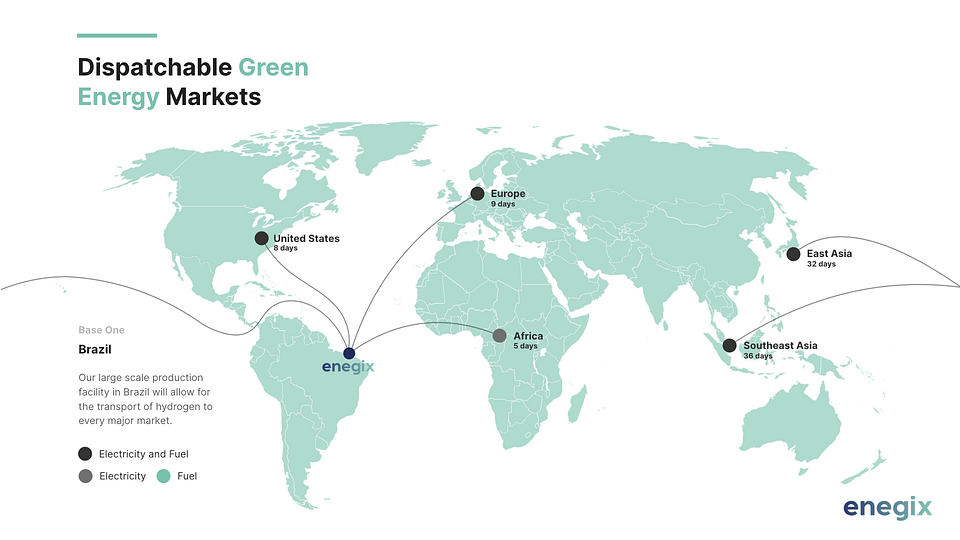Singaporean/Australian company Enegix Energy is moving forward with plans to build a huge clean hydrogen plant on the northeast coast of Brazil. The US$5.4-billion Base One project is intended to transform solar and wind power into more than 600 million kg of green H2 annually.
A 1,200-acre (485-ha) site has been scoped on commercial land in the Port of Pecém, in the state of Ceara, and earmarked for what Enegix describes as the world’s single largest carbon emission reduction project. With 3.4 GW of solar and wind power already contracted from Enerwind, Base One is expected to go live within three to four years.
Its location, so close to a deep-sea port, will facilitate international exports. Tankers carrying Liquid Organic Hydrogen Carrier (LOHC), which stays liquid under ambient temperature and pressure, will be able to reach the east coast of the United States within eight days, Europe within nine days, or Africa within five days. Exporting to the Asian market will take more than a month.

Enegix
Local conditions near the site are advantageous for renewables; Enegix says Base One can potentially expand from its initial 3.4-GW energy supply to more than 100 GW, and with an appropriate expansion of hydrolysis facilities, the plant could eventually generate more than 30 times as much hydrogen as it will initially.
This development – currently at the feasibility study and capital raising stage, with MoUs signed with an engineering and construction firm, an energy supplier and the State Government of Ceara – would be 20 times larger than the biggest green hydrogen plant in operation today – Air Liquide’s 20 MW hydro-to-hydrogen operation, which has just opened in Quebec.
If Base One is up and running at 3.4 GW by 2025, it may indeed be the world’s largest such facility. Or it might not; China has the ability to deploy massive capital and build giant projects at an extraordinary pace, and Beijing Jingneng Power Co. announced last March that it was starting construction on a 5-GW wind-and-solar-to-hydrogen-and-storage facility in Mongolia, set to open in 2021. Where that project sits is unknown; even Bloomberg can’t get Jingneng on the phone.
Either way, there are other whoppers in the pipeline. Saudi Arabia has announced a 4-GW project for its $500-billion “future megacity” of Neom, scheduled to open in 2028, NortH2 is working on a massive 10-GW offshore-wind-to-H2 project off the Dutch coast for 2040, and they could all be dwarfed by the Asian Renewable Energy Hub, a Western Australian project with more than 26 GW of generation capacity that will open sometime after 2030, exporting hydrogen and ammonia to the Asian region.

Enegix
It’s hard to evaluate Enegix’s claim that this will be the world’s biggest atmospheric carbon reduction project, but the company says Base One has the potential to reduce CO2-equivalent emissions by as much as 10 million tonnes per year, depending of course on the global uptake of hydrogen energy use projects, and exactly what that hydrogen is used to replace at the customer end.
Ten million tonnes a year certainly sounds like a lot, but to give you a sense of the scale of the problem, human activity is currently responsible for the greenhouse equivalent of about 50 billion tonnes of CO2 each year – a figure that’s set to rise fast in the coming decades without serious action. A pioneering project the size of Base One, then, has the potential to offset about 1/50th of one percent of the problem – 1/5,000th of all human emissions – if deployed optimally.
Such is the colossal challenge the world faces if it’s to reach net zero emissions by 2050 and stave off some of the worse case climate scenarios expected if things continue unabated.
Source: Enegix
Source of Article